
Alphabetical Menu
Chronological Menu
|
1982  The faculty and students of a school in Lebanon deal with the imminent invasion of Beirut during the 1982 Lebanon War. Meanwhile, Wissam (Mohamad Dalli), a shy 11-year-old student, has a crush on a classmate, Joanna (Gia Madi), so he asks his friend, Majid (Ghassan Maalouf), to help him confess his feelings for her. Joanna lives beyond a checkpoint in Beirut that would make it hard for them to visit each other outside of school, but that doesn't deter Wissam from pursuing her. The contrasting political beliefs of Joseph (Rodrigue Sleiman) and Yasmine (Nadine Labaki), two teachers in love, threaten the stability of their relationship. Although 1982 is set during the 1982 Lebanon War, it's not really a war film per se; it's a story about human beings, love, and innocence amidst dark times. Even within a dark tunnel, there could be a small light. Writer/director Oualid Mouaness captures that light in the dark tunnel, so-to-speak, as he focuses on the relationships between Wissam and Joanna, Wissam and Majid, and Joseph and Yasmine, while the war and imminent invasion remains in the background, for the most part. The interactions between Wissam and Joanna are sweet, tender and heartfelt without being cloying. Anyone who has ever had a first crush as a child will be able to relate to Wissam. It's also interesting that Wissam has a vivid imagination, like many children, and is good at drawing. At one point, Mouaness incorporates animation in the film that provides the audience with a window into Wassim's imagination in a very inventive and poignant way. The relationship between Joseph and Yasmine is more complex, but just as grounded in humanism, a truly special effect. Mouaness eschews showing the life of either of the characters at home, so he keeps the film lean while omitting any padding. However, there's just enough exposition for the audience to infer what their home life might be like. Similarly, the horrors of the war are left to the audience's imagination. Most importantly, though, he brings the characters to life enough for you to care about them as human beings. The performances by all of the actors and actresses, even those in the smaller roles, are genuinely heartfelt. Nadine Labaki is radiant and charismatic, just as expected. The brief use of animation during a key scene that won't be spoiled here helps to invigorate the film while adding a thought-provoking layer of lyricism through metaphors. A metaphor can also be found in the birds that show up inside the school; no, the birds aren't used in the same exact way that Hitchcock uses them as symbolism in The Birds, but it's just as intriguing. Poetry, after all, is a form of protest. Even love poems are a protest against something. What is 1982 for or against? The fact that it's a protest against war and for love is quite obvious, but it's a vital, timely and profoundly human message well worth repeating loud and clear. At a running time of 1 hour and 40 minutes, 1982 is a triumph. It's an engrossing, poetic and life-affirming emotional journey.
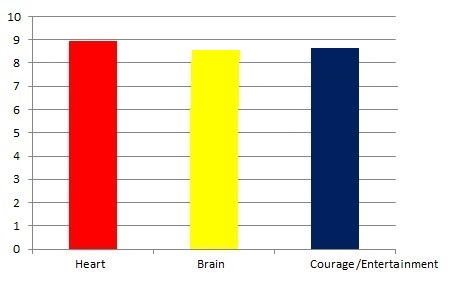 Jurassic World: Dominion 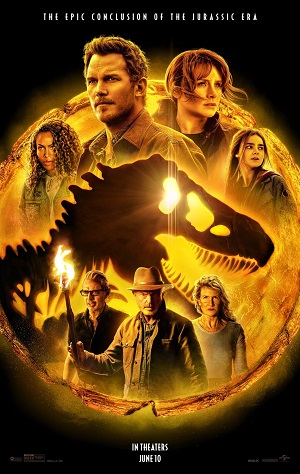 In world where dinosaurs and humans coexist, Dr. Alan Grant (Sam Neill) and Dr. Ellie Sattler (Laura Dern) team up to find evidence that Lewis Dodgson (Campbell Scott), CEO of BioSyn, a genetics company, has created genetically engineered locusts that pose a threat to mankind. Meanwhile, Owen Grady (Chris Pratt) and Claire Dearing (Bryce Dallas Howard) raise their daughter, Maisie (Isabella Sermon), a clone, who gets kidnapped and sent to the research lab of Dr. Henry Wu (BD Wong). The screenplay by writer/director Colin Tervorrow and co-writer Emily Carmichael gets increasingly convoluted and preposterous as multiple subplots merge together. If you're expecting a lot of dinosaur action and thrills, prepare to be disappointed because genetically-engineered locusts have taken the dinosaurs' place as a main plot device. Despite so much going on with so many characters, motivations and conflicts, very little actually sticks. Did the filmmakers never learn that less is more? A convoluted plot could ultimately work if the third act ties everything in a compelling and believable way, but that doesn't happen here. Even within the film's internal logic, it lacks believability, i.e. when a plane crashes into the ice and two characters emerge unscathed as though they were walking out of a minor car crash. Even their hair doesn't get messy. In another scene, a car rolls down a hill and, you guessed it, everyone emerges from the car unscathed. That doesn't even factor in the "coincidence" that they rolled down a hill right in front of other important characters that they happened to be looking for. Then there's the dialogue that ranges from stilted to just plain dumb, i.e. when a plane is clearly falling and the pilot, Kayla (DeWanda Wise), yells that they're falling. Anyone, especially the characters, would know and see that they're falling. It's not rocket science. Why state the obvious? Is this supposed to be a spoof of Jurassic Park? If so, it's not funny. Speaking of humor, the attempts of comic relief doesn't really work either, i.e. when Dr. Alan Grant interacts with a barista to try to stall him from the private conversation that Dr. Ellie Sattler has with Dr. Ian Malcolm (Jeff Goldblum) nearby. The only laughs, unfortunately, are bad laughs, especially during the clunky exposition when Maisie discovers that she's a clone. The villains are poorly-written because they're one-note caricatures. All of the characters seem to only exist in Jurassic World: Dominion to move the plot forward, so when the plot fails to entertain and the characters fail to be engaging on any level, what's left? The CGI is what's left. At least Jurassic World: Dominion has stunning CGI that adds some spectacle, but not nearly enough to invigorate the film. The action scenes are forgettable with poor editing and the thrills gradually wane. This could've at least been an exhilarating rush of adrenaline like the original Jurassic Park, but there are far too few exhilarating scenes. Even the quiet drama 1982 has a much more memorable and exhilarating use of CGI. The performances range from decent to terrible. Campbell Scott's performance is like nails-on-a-chalkboard. Does he need some cheese to go with all of that ham? The always-reliable Jeff Goldblum has far too few scenes, so he's wasted. The only one who shines is DeWanda Wise as the pilot, but she, too, remains undermined by the very weak, lazy screenplay. At a running time of 2 hours and 26 minutes, which feels more like 4 hours, Jurassic Park: Dominion is yet another overwrought, clunky, asinine and overlong sausage from Hollywood's sausage factory.
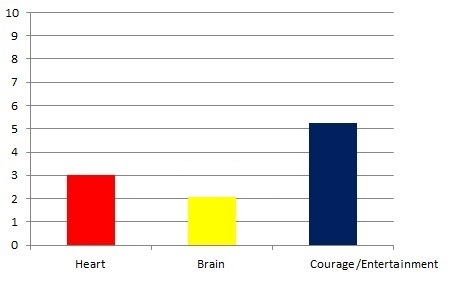 Lost Illusions 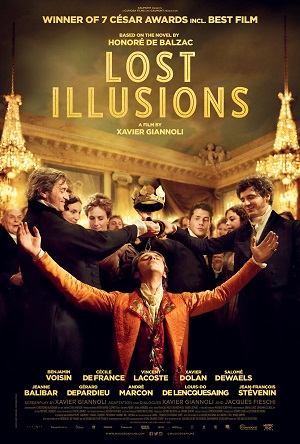 In 19th Century France, Lucien de Rubempre (Benjamin Voisin), an aspiring poet, arrives in France hoping to become a novelist. Instead, he ends up working as a newspaper journalist for editor Étienne Lousteau (César winner Vincent Lacoste) who has no shame in crossing ethical boundaries by knowling printing false information as long as he gets paid well for it. He befriends Nathan (Xavier Delon) who also becomes his adversary, and tries to woo a married woman, Louise de Bargeton (Cécile de France) before settling for a single woman, Coralie (Salomé Dewaels). Gérard Depardieu plays Dauriat, an arrogant publisher, and Jeanne Balibar plays Louise's cousin, Marquise d’Espard.
Based on the novel Illusions Perdues by Honoré de Balzac, the screenplay by writer/director Xavier Giannoli covers a lot of ground in the life of its protagonist, Lucien de Rubempre. He's an orphan with a troubled childhood and hopes to follow his dreams to be a successful writer. To get there, though, is no easy task as he quickly realizes. The literary industry as well as the newspaper industry are dog-eat-dog worlds where there's no respect for integrity, truth, decency and fairness. Lucian's ambition to succeed and how he learns new perspectives on what success means to him are part of what makes him such an engaging character. He's not very likable, but that's okay because entirely decent characters are usually boring. Giannoli doesn't focus much on his childhood, though, despite that it has such a strong effect on his life as an adult. Lucien clearly doesn't have any truly good role models. It's fascinating to watch him climb the ladders, so-to-speak, as he learns how to become more successful, even if it means sacrificing his integrity. When it comes to his love life and friendships, i.e. with Coralie and Nathan, that's where Lost Illusions comes up short a bit as it doesn't delve into them enough. His friendship with Nathan, in particular, remains under-explored, which makes the film less emotionally engrossing as it could've been. Also, there's excessive narration that spoon-feeds the audience too much and slightly distracts from the narrative momentum. That said, Lost Illusions rarely has a dull moment, and Lucien remains as an intriguingly flawed and complex character. A huge part of what makes Lost Illusions so captivating is its well-chosen cast from the main characters to the supporting ones. Even Jean Balibar, who doesn't have that much screen time makes the most out of her scenes. Gérard Depardieu is perfectly cast and brings plenty of charisma to his role as does Benjamin Voisin in the lead role. Everything from the costume design to the set design, music, make-up design and lighting are stunning without going over-the-top with style. The pacing moves just right and the editing is fine, too, with no scenes that overstay their welcome. It says a lot about writer/director Xavier Giannoli's strengths as a good storyteller that the audience doesn't feel the weight of the 2 hours and 29 minutes running time too much. There's enough material in the film to justify a much longer running time. Ultimately, Lost Illusions is captivating and gripping with a terrific ensemble cast and exquisite production design.
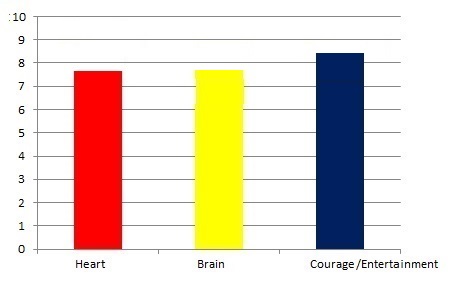 Tahara 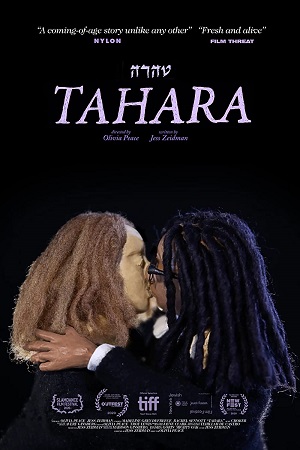 Carrie Lowstein (Madeline Grey DeFreece) and her best friend, Hannah Rosen (Rachel Sennott), attend the funeral of their classmate, Samantha Goldstein, who committed suicide. Hannah has a crush on Tristan (Daniel Taveras), Samantha's boyfriend, and wants to make a move on him during the funeral. Meanwhile, Carrie gradually learns how toxic Hannah is as a friend. Tahara is a refreshing exploration of female friendship, something that's rarely depicted in films these days. The screenplay by Jess Zeidman doesn't show any scenes with the deceased girl, Samantha Goldstein, nor does it delve into her suicide, so this isn't the kind of film that has much to say about that dark theme or about grief for that matter. It's hard to watch Tahara without thinking about Shiva, Baby which has many similarities in theme, tone and both films star Rachel Sennott, although the friendship between Carrie and Hannah is more reminiscent of the relationship between Enid and Rebecca in Ghost World. To be fair, Tahara takes a while to get compelling as it becomes increasingly obvious that Hannah is essentially a narcissist, much like Enid. She's much more of a mess than Enid, though: she's selfish, insecure and inconsiderate. A glaring example of her selfishness occurs when she has the nerve to ask Tristan to meet her in the library to have sex with her while he's still grieving the loss of his girlfriend. He's clearly shocked by how strongly she comes onto him; it's pretty much sexual coersion. Then when she expects Carrie to join them in a threesome just adds to how toxic she is. Fortunately, Carrie recognizes that toxicity. What's not too clear, though, is whether Hannah has any self awareness or where she got her toxicity from. Every behavior is learned from somewhere, most often from one's mother and father. Ghost World and Shiva Baby both provided audiences with a glimpse of the parents of the protagonists to better understand the source of their issues and emotional pain. Tahara doesn't show their parents, though, while barely exploring their emotional pain to boot. When Hannah and Carrie's relationship breaks apart, that's when the film begins to show some depth and honesty as it gets to the emotional center of the story. Until then that point though, though, it mostly meanders while lacking the wit and narrative momentum found in the superior Shiva Baby. Madeline Grey DeFreece and Rachel Sennott are both superb in their roles while making the most out of their scenes. They have great chemistry together and help to make Carrie and Hanna seem like best friends, at least at first, until they begin drift apart. Any emotional depth comes from their performances rather than from the screenplay. Director Olivia Pearce includes some scenes in claymation and, like Xavier Dolan does in Mommy, plays around with aspect ratio, which add both style and substance to the film. At a brief running time of 1 hour and 17 minutes, Tahara is mildly engaging and well-acted exploration of female friendship, but not as witty, profound or moving as Shiva Baby or Ghost World. It would make for an interesting double feature with the underrated and underseen film from Hollywood's Golden Age, Junior Miss.
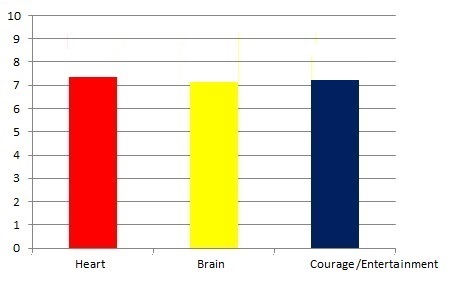 |